1st International Summit for Smart Cities in North Africa.
2014
This was the official website for the 1st International Summit for Smart Cities in North Africa.
The International Summit for Smart Cities in North Africa aims to contribute to the social and economic development of North African cities by helping them integrate “smart” initiatives. It was the brainchild of the Montreal-based Smart Initiatives Group. The Summit was held at the prestigious Al-Akhawayn University in Ifrane.
Content is from the site's archived pages.
9-10 June
Al Akhawayn University
Ifrane, Morocco
Overview
The 1st International Summit for Smart Cities in North-Africa 2014 will be a unique opportunity to exchange ideas on improving urban life. We live in an era where technological innovation is changing the ways in which cities are governed and citizens, businesses, and public institutions interact.
The main goal of the Summit is to find innovative and actionable solutions for urban living within the North African geopolitical context. The event will delve into key issues such as innovation and economic growth, urban planning and mobility, resource management and infrastructure, education, digital inclusion, and governance.
City leaders, government officials, academics, urban planners, utility providers, and city experts will all come together to discuss and present best practices for developing the smart cities of tomorrow. They will also introduce innovative strategies for strengthening the institutional efficiency of cities and measuring public engagement to competitiveness and sustainability.
This event, the first of its kind in the region, will offer a unique peer-to-peer learning environment as well as exclusive networking opportunities. Understanding the tools, processes, and models best suited to fostering integrated communities and smart cities will help stakeholders develop strong, secure, and sustainable
This event, the first of its kind in the region, will offer a unique peer-to-peer learning environment as well as exclusive networking opportunities. Understanding the tools, processes, and models best suited to fostering integrated communities and smart cities will help stakeholders develop strong, secure, and sustainable infrastructure for all citizens.

Our Mission
The International Summit for Smart Cities in North Africa (ISSC) is an annual gathering that aims to contribute to the social and economic development of North African cities by helping them integrate “smart” initiatives.
The ISSC focuses on connecting illustrious minds from the international community, notably North America, with influential policy makers in North Africa, allowing them to work together on key issues like information and communications technologies (ICT), innovation, and sustainability.
Why Attend?
The first International Summit for Smart Cities in North Africa 2014 is an exclusive event that will see eminent thinkers, movers, and shakers from around the world gather in Morocco to help define smart socio-economic policies for the region. It is thus a unique and exciting opportunity for attendees to meet these industry pioneers and contribute to the future of our cities.
Attendees include:
- Ministerial, Regional, and Provincial Officials
- City Leaders
- Businesses
- Consultants
- Researchers
- Engineers
- Urban Planners
- Technology Providers
- Utility providers
Advisory Board
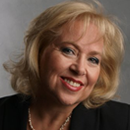 Marie-Andrée Doran
Marie-Andrée Doran
“The accelerated growth of urbanisation across the planet gives cities increased powers, but also increased responsibilities. In this context, urban governance is of crucial importance to maintaining quality of life and sustainable development in cities and communities. For me, the smart city is not a utopian ideal, but an opportunity to rethink urban development in order to meet the challenges of the future. It aims to optimally integrate digital tools to increase the efficiency of services, guarantee the wellbeing of its citizens, and favour sustainable economic development and integrated governance. It should be understood that transforming a place into a “smart city or community” is a process of overall planning and construction that will take several years. This construction process must involve the different components (economic, social, and environmental) of the urban fabric to build an innovative, thriving, citizen-centric, and sustainable city.” Text translated by the ISSC team
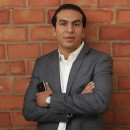 Tarik Fadli
Tarik Fadli
“We must work together to adapt IT solutions to the north African context while aiming for a triple objective: proximity, interoperability and open data. The citizen must be a stakeholder in the digital society by engaging with public actors to co-create sustainable cities. As solution providers, we strive to deliver humanistic application of IT through dematerialization of most needed city services. This International Summit for Smart Cities in North-Africa is more than an exchange platform, it is a space of encounter and an initial point of future synergies.”
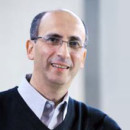 Younes Messaddeq, PhD
Younes Messaddeq, PhD
“It is well known that communication technologies and optical fibers are required to meet the growing economic and business needs of smart cities everywhere in the world. However, efficient and omnipresent communication is not the only thing that defines smart cities. My research in photonics and optical fibers at Université Laval have real life applications in fields such as health, environment, energy and security. It touches many sectors of the economy and is essential to the development of smart cities in North Africa since it contributes to the well being of society.”
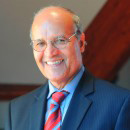 Driss Ouaouicha, PhD
Driss Ouaouicha, PhD
“Cities in North Africa today face the challenge of combining competitiveness and sustainable urban development. This challenge is likely to have a growing impact on issues of urban quality such as housing, economy, culture and social and environmental conditions. Al Akhawayn University is partnering and the municipality of Ifrane and the region to launch the smart city of Ifrane project. Given the challenges in the Moroccan context, we are working to adapt technology to local needs and make the urban sphere a better environment for sustainable development and a space for happy citizens by integrating Information technology in the daily service to the local population. It is hoped that Ifrane could later serve as an example for other larger cities in Morocco and parts of North Africa.”
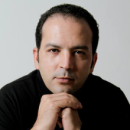 Nabil Ouchagour
Nabil Ouchagour
“North African cities are facing many challenges, from a large population of youth to migration. Studies predict that 50 % of Africa’s population will be living in cities in the next 30 years. Therefore, it is urgent that we put around the table decision makers, intellectuals, scholars and representatives of the civil society in order to define a common vision for the region. The benefits of technology and innovation are essential to decrease the pressure on resources. According to the World bank “some cities are taking a different stab at “smart”. They go for a better relationship between citizens and governments leveraged by technology.” which results a more implication of citizens in their neighborhoods. The 1st International Summit for Smart Cities is the beginning of a journey.”

Smart Cities in North Africa: A Localized Debate about a Global Trend
by Mehrunisa Qayyum | 07/17/2014
Walking past the Check-in counter in Casablanca’s Mohamed V International Airport, a digital sign claims X amount of solar energy used and X amount of energy savings occurred in powering a transit hub with the use of polycrystalline panel technology. As a tourist, this may come as a pleasant surprise if she has not yet had the opportunity to see other improvements, like Rabat’s tram system. As a citizen, this may be inspiring as the term “smart city” hints at better infrastructure and technology use. However, what qualifies a city as a “smart city” is more often a topic for discussion only among Maghreb countries and not implementation. Infrastructural developments like this--as well as challenges with water access and traffic jams--prompted the 1st annual International Summit on Smart Cities in North Africa (#ISSC2014) at Al-Akhawayn University in Ifrane, Morocco.
Although Morocco contrasts with its wealthier Maghreb neighbors (Algeria, Tunisia, and Libya) as the only lower middle-income country, its number and diversity of cities invite a range of urban planning debates--from managing green spaces to increasing access to energy and water. Organizers of the #ISSC2014 pieced together a working definition of a “smart city” by covering four themes: 1) Urbanization, 2) Digital Inclusion, 3) Governance, and 4) Mobility.
One of the key questions tackled at the conference, especially apt for the local context, was: How does one promote a rural “smartcity” development while respecting its local culture? Or more aptly stated by Louis Zacharilla, Co-Founder of the Intelligent Community Forum: “be more of who you are, and continue to overlay with modern tools and technology...”Maghreb cities should not try to become the next Silicon Valley, he continued, because Silicon Valley developed out of an organic process not by fiat. Moreover, each geographical area has its own distinct qualities. Maghreb cities possess their own distinct richness, which cannot be reproduced in Europe or China or the Gulf countries. For example, promoting solar energy is not as viable an option for China due to its smog challenge. The Maghreb does not have this challenge--yet.
​​ICF defines a smart city as demonstrating the following:
- Guaranteeing connectivity: the Internet is a utility -- not just a technology, it is as vital to social inclusion and productivity as electricity;
- Eliminating its “Middle of Nowhere” status; and
- Using knowledge, research, creativity & collaboration as tools for economic development.
A number of other key questions guided the discussion at the conference: How can “smart city” design change the industry of transportation efficiency? Is there a risk for a “smart city” to become "overdigitized", or rely too much on information communication technology when it comes to maintenance costs behind upgrading cities into “smarter” cities? There was also a cautionary tone that certain cities in the region, like Masdar City, risked becoming too “techno-centered rather than human-centered”, in the words of Moroccan urban planner, Hassan Radoine. There is a difference between becoming a more modern city rather than a “smarter city”. A modern city may reinvent itself at the expense of the needs of the local community, and may forget the need for public spaces.
Applying more technology tools, alone, does not immediately qualify a city to be “smarter”. According to Carlo Ratti, Director of the Sensable City Laboratory at the Massachusetts Institute of Technology, ‘smart city’ design responds to citizen behavior. The most beautiful challenge is to take a city and improve upon it rather than starting from scratch, explained Ratti. In Maghreb country cases, ‘smart city’ design should respond to water resource challenges in a coordinated fashion to remain sustainable. For example, Morocco may consider a version of the Digital Water Pavilion, which brings water into the multi-functional, public space while educating citizens about water use.
Alternatively, another definition of “smart city” focuses on increasing instrumentation, like installing elevators en masse, as well as increasing interconnection, says Jean-François Barsoum, a Senior Consultant at IBM. Increased interconnection means making effective use of real-time data to make informed decisions on range of urban issues, such as traffic, crisis management and safety regulation. Capturing water data may help prepare for the next 10 years regarding water needs and avoid digging unnecessarily. Big data combined with sensory technology would also rationalize food production and planning, added Barsoum. In a smarter city, city management officials would use sensors to optimize and irrigate crops.
In Morocco’s case, Mohamed Attahri, believes that Casablanca’s traffic problems hold it back from operating as a smarter city. In the last 12 years, Morocco has seen a 55 percent increase in vehicles on the road--a problem that Casablanca needs to address whether it ops for the ‘Smart City’ path or not. Attahri argued that a one percent efficiency gain in Morocco traffic could result in over $550 million in savings. He developed the tool ‘Greendizer’ to map traffic problems in Casablanca, but its future application depends on how quickly the technology is adopted locally. Given the adoption curve of the mobile phone, one can be optimistic.
Not all attendees shared the enthusiasm for smart cities. Many saw them as nothing other than techno -utopias for those that could afford to live in such environments. As a few participants countered, a “smart city” needs more educated citizens without widening the rural-urban divide. Moreover, even if a “smart city” requires more than technology investment, how will urban planners avoid widening the digital-divide that tends to favor more urban environments? A “smarter city” requires broadband, a knowledge workforce collaborating with a university, innovation, and digital inclusion.
In closing, the Intelligent Community Forum offered Morocco an invitation to nominate a smart city site to join the 21 smart cities by 2017. It will be interesting to see whether Morocco selects a mid-sized town, metropolis, or invests additional resources into creating a new site, like Masdar City in the UAE. Whichever site is selected for a North Africa “smart city”, hopefully a local university will participate as a key stakeholder.
Testimonials from the 2014 Edition
Notes from Ifrane: a Swiss-infused town in the middle of Morocco's Atlas heights where the hot topic of the day was how could "smart city" technologies be applied in North Africa? How could they have an impact beyond the glossy case studies of the uber-developed world?
Carlo Ratti, Director MIT SENSEable City Lab
I was invited to participate in the inaugural edition of the International Summit for Smart Cities in North Africa, the first of its kind in the region. I was very impressed with the caliber of attendees — a high proportion of executive-level decision makers in government offices, large IT vendors, as well as mayors, ministers and deputy ministers. Speakers were world-class, as good or better as I've seen in any event of its kind. Kenza managed this intense two-day session extremely well, and I'm quite confident she has received kudos from all involved. Given the opportunity, I would definitely work with her again.
Jean-François Barsoum, Consultant délégué principal, Villes Intelligentes (Eau et Transport) -IBM
Cette 1ère édition du Sommet International des Villes Intelligentes en Afrique du Nord a été riche et stimulante en termes d’échanges, elle a contribué à apporter un éclairage sur les réalités du contexte des pays en développement tout en soulignant les innovations qui y prennent déjà naissance. Cet événement a aussi été propice à l’établissement de contacts notamment avec des chercheurs et élus locaux, ce qui devrait permettre d’initier de futurs projets de collaboration.
Sylvie Daniel, Professeure Chercheure en Sciences Géomatique –Université Laval
International Summit for Smart Cities in North Africa was a unique opportunity to discover the work of leaders from different sectors. Researchers, academicians, entrepreneurs and elected politicians were challenging each other about their ideas, findings, projects and concepts. As a moderator, it was challenging and very enriching experience. The enthusiasm felt among all participants is only a proof that the first edition was only the beginning of a long road. Because it takes time, commitment and energy to “build” smart cities for smart communities. And it takes much more mobilization, leadership and debate to keep it smart, since communities grow and the definition of a smart city grows with.
Nabil Ouchagour, Consultant & Columnist
The event sparked off many interesting conversations and debates with leading companies, city and university representatives. It’s been a great opportunity for us to showcase our technology, and confront our vision and ideas with world-class experts in the field. We’re looking forward to the second edition.
Mohamed Attahri, CEO -Megapolis
Le sommet a permis aux acteurs de la société civile et aux fournisseurs de services et de technologie d’échanger et de partager leurs visions des communautés intelligentes. De tels échanges sont essentiels pour piloter l’innovation nécessaire à l’émergence de communautés intelligentes respectueuses de l’environnement, et en particulier chez les fournisseurs de services d’électricité qui sont des acteurs-clés de cette transformation.
Marcoux Benoit, Directeur Principal -Capgemini